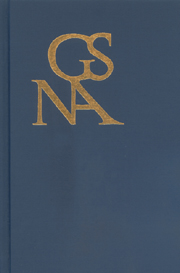Book contents
- Frontmatter
- Contents
- Towards a German Romantic Concept of the Ballad: Goethe's “Johanna Sebus” and Its Musical Interpretations by Zelter and Reichardt
- “Trübe” as the Source of New Color Formation in Goethe's Late Works Entoptische Farben (1817–20) and Chromatik (1822)
- The Myth of Otherness: Goethe on Presence
- The Transformation of the Law of Nations and the Reinvention of the Novella: Legal History and Literary Innovation from Boccaccio's Decameron to Goethe's Unterhaltungen deutscher Ausgewanderten
- “Hear him! hört ihn!”: Scholarly Lecturing in Berlin and the Popular Style of Karl Philipp Moritz
- Hypochondria, Onanism, and Reading in Goethe's Werther
- Judex! Blasphemy! and Posthumous Conversion: Schiller and (No) Religion
- Esoterik der “Macht, die über uns waltet und alles zum Besten lenkt”: Das Wissen vom Anderen in Goethes Wilhelm Meisters Lehrjahre
- Goethes Fortgepflanztes: Zur Unbegrifflichkeit der Morphologie
- Special Section on Die Entstehung der Neueren deutschen Literaturwissenschaft aus der Goethe-Philologie
- Book Reviews
Hypochondria, Onanism, and Reading in Goethe's Werther
Published online by Cambridge University Press: 05 February 2013
- Frontmatter
- Contents
- Towards a German Romantic Concept of the Ballad: Goethe's “Johanna Sebus” and Its Musical Interpretations by Zelter and Reichardt
- “Trübe” as the Source of New Color Formation in Goethe's Late Works Entoptische Farben (1817–20) and Chromatik (1822)
- The Myth of Otherness: Goethe on Presence
- The Transformation of the Law of Nations and the Reinvention of the Novella: Legal History and Literary Innovation from Boccaccio's Decameron to Goethe's Unterhaltungen deutscher Ausgewanderten
- “Hear him! hört ihn!”: Scholarly Lecturing in Berlin and the Popular Style of Karl Philipp Moritz
- Hypochondria, Onanism, and Reading in Goethe's Werther
- Judex! Blasphemy! and Posthumous Conversion: Schiller and (No) Religion
- Esoterik der “Macht, die über uns waltet und alles zum Besten lenkt”: Das Wissen vom Anderen in Goethes Wilhelm Meisters Lehrjahre
- Goethes Fortgepflanztes: Zur Unbegrifflichkeit der Morphologie
- Special Section on Die Entstehung der Neueren deutschen Literaturwissenschaft aus der Goethe-Philologie
- Book Reviews
Summary
Johann Wolfgang von Goethe's pathbreaking epistolary novel, Die Leiden des jungen Werther (1774, 2nd [rev.] ed. 1787) has been the focus of an enormous amount of scholarly attention. A recent analysis by Bruce Duncan of more than two centuries of Werther criticism, Goethe's “Werther” and the Critics (2005), makes manifest the wide variety of critical approaches to this extremely rich text. Duncan discusses, among other things, contemporary late eighteenth-century reactions to Werther, biographical, religious, psychological, and political approaches to Goethe's novel, as well as interpretations of Werther that focus on reading, writing, gender, and/or sexuality. The literary critic Michael Bell has determined that critical responses to this novel generally reflect one of two divergent modes of understanding Werther: readers tend to view Werther as either “a romantic tragedy” or “a neurotic casehistory,” depending on whether they are reading in an “identificatory” or an “ironical” manner. Bell views these trends as equally justifiable yet mutually exclusive methods of reading the text. Bell's understanding of the novel's critical reception explains not only the intense response, both enthusiastic and condemnatory, from eighteenth-century readers, but also the great number of scholarly contributions that have read Werther as a pathography. The tradition of reading Werther as a pathography goes back as far as the contemporary reception of the novel in the late eighteenth century, as in, for example, Friedrich Nicolai's Freuden des jungen Werthers: Leiden und Freuden Werthers des Mannes (1775), a text which will be discussed later in this essay.
- Type
- Chapter
- Information
- Goethe Yearbook 19 , pp. 117 - 142Publisher: Boydell & BrewerPrint publication year: 2012

